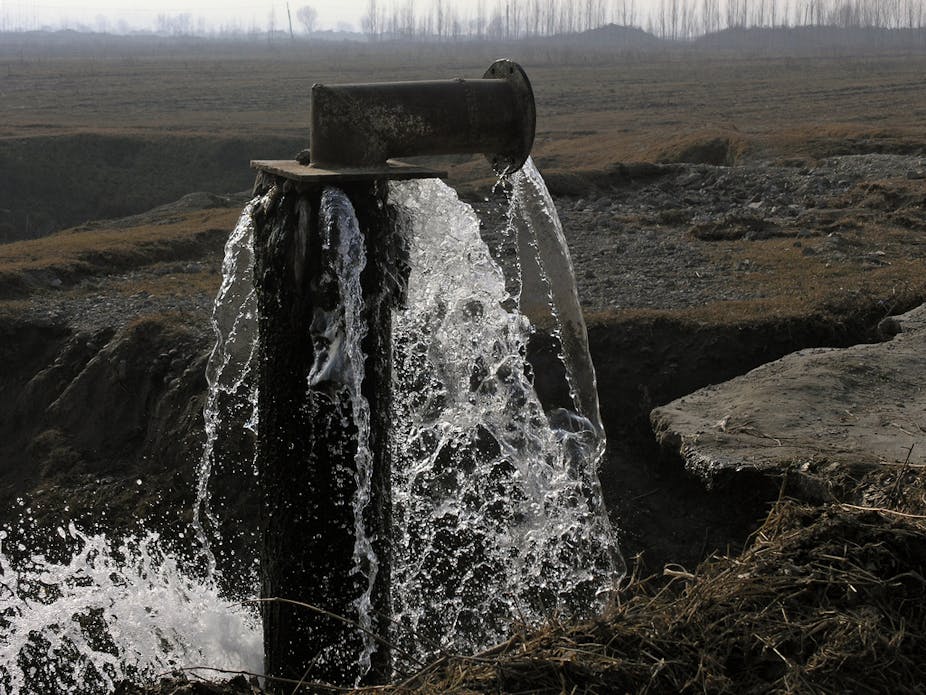There’s been much debate this past month about Britain’s rising gas and electricity bills. Price hikes have followed utility companies’ reports of massive increases in profits, such as Scottish Power which more than doubled its pre-tax profit in the year it raised gas and electricity prices by 7%.
This has caused anger, not least because more than 3m people spent 2011 in fuel poverty. Add the Prime Minister David Cameron’s comments, backed by the industry, that price rises are due to green levies, and the outlook is that people are forced to choose not only between heating and eating, but between eating and hope for a habitable climate.
So while energy politics inevitably involves debating how to balance cost, climate change and poverty (among other issues), the water industry has managed to skirt such debate – despite the same issues. The average cost of water per household is relatively small compared to gas and electricity, at £388 compared to £1,279. Nonetheless, water poverty in the UK is a very significant problem. Between 2009-2010, nearly a quarter of households were in water poverty, defined as spending more than 3% of their income on water.
Water prices have consistently risen since the industry was privatised in 1989, faster than overall prices in the UK and faster than average earnings. Partly this is due to increasing water provision and treatment costs, affected by various factors including climate change-related flooding and drought, over-use and waste, but also by ageing, leaking pipes. So innovation that will help drive down these costs is key.
The “innovation barrier”
In a recently published paper with Susan Molyneux-Hodgson from the University of Sheffield, we presented findings from two years of research studying a group of academic researchers’ efforts to generate bold technical innovation for the water industry. We explored how researchers and the industry worked together and how these groups explained the lack of funding for adventurous innovations.
A recurring story is of the UK’s impregnable “innovation barrier” for developing cutting-edge technologies, for which there is very little funding as most available money from the UK Research Councils and from industry goes toward incrementally improving existing techniques.
We found the lack of industrial investment was explained by claiming consumers were ignorant of the costs and “true value” of water. This meant they were unwilling to pay the “real costs” of provision, and of research and development to tackle infrastructure and climate change-related problems. Consumers were often blamed for their influence on regulators, who seemed unwilling to let the companies charge more.
Many academics in natural sciences and engineering bought into the idea that the problem wasn’t so much with monopolies profiting massively from essential water services – while the infrastructure aged and climate change got worse – but with consumers, who just couldn’t – wouldn’t – accept how much it would cost for problems to be fixed.
Ultimately, the construction of the problem framed its own solution: the industry wants to educate consumers about the value and costs of water so they will be willing to pay more for research and innovation, which the industry believes will help solve leakage and climate change problems. Is it right to be sceptical of the idea that charging more for water would result in greater research and infrastructure investment?
Short term profit over long term gains
Well, in the UK investment in research and development varies from a barely visible 0.02% of turnover up to a mere drop in the ocean at 0.66%. We found those in industry saw no clear incentive to invest in bold technological programmes of innovation if there wasn’t a clear profit to come from it.
Of course, investments in technologies to help protect us against floods and storms, shortages and droughts, and to help reduce the impact we’re having on the environment cannot easily be turned into short-term profit-making ventures. But clearly existing costs would be astronomical if we allowed the effects of climate change to escalate and the infrastructure to crumble.
Technologies are not the only thing we need to help alleviate these problems – we also have to look at consumer and corporate practices. But technological innovation is important. The costs of innovation are not too high, they are essential, but the companies still aren’t willing to pay.
The utilities regulators and our politicians have to be brave and challenge the industries. Because David Cameron’s desire to cut green levies to tackle household fuel bills is the same as “educating” consumers as to the “true value” of their water – a means to protect profits for shareholders at the expense of the UK’s most impoverished, and potentially at the cost of the planet.
First published on Policy@Manchester’s Manchester Policy Blogs

